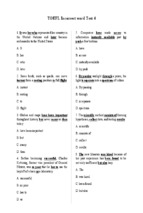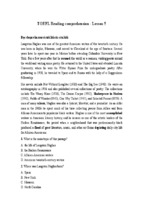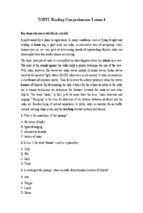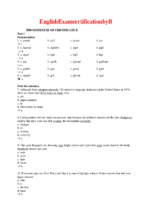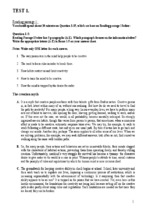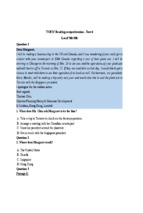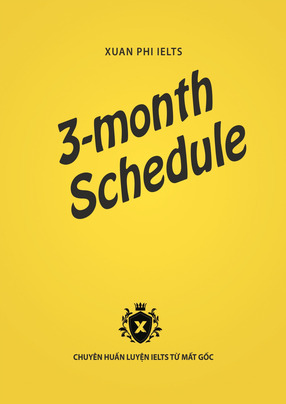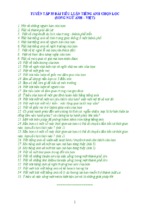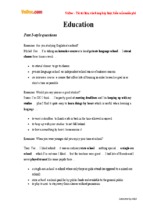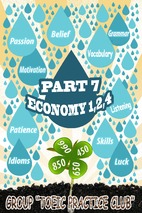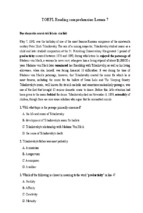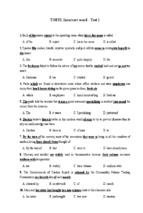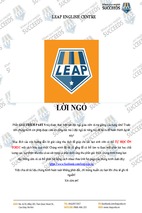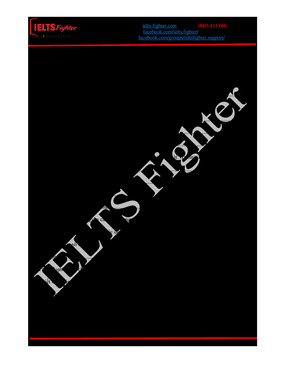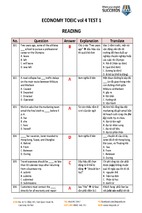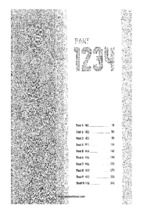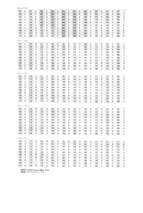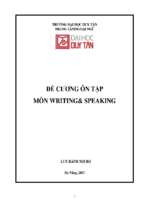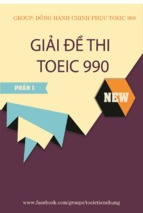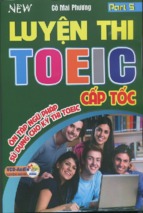KHÓA TỔNG ÔN KIẾN THỨC – Cô VŨ MAI PHƯƠNG
SENTENCE COMPLETION – P3
Ex 1. Mark the letter A, B, C, or D on your answer sheet to indicate the best sentence built from
the given words or phrases.
76. look/ forward/ your reply.
A. We look forward to receiving your reply.
B. We are looking forward to receive your reply.
C. It looks forward to receive your reply.
D. They are look forward to receiving your reply.
77. wait/ him/ since 8 o’clock.
A. I have been waited for him since 8 o’clock.
B. I have been waiting for him since 8 o’clock.
C. It has been waited for him since 8 o’clock.
D. It has been being waited for him since 8 o’clock.
78. concert hall/ so crowded/ saw/ heard/ nothing.
A.The concert hall was too crowded that we saw and heard nothing.
B.The concert hall was so crowded that we saw and heard nothing.
C.The concert hall was crowded enough so we saw and heard nothing
D.The concert hall was such crowded that we saw and heard nothing
79. mother/ shop/ twice/ week.
A. My mother goes to shop twice a week.
B. My mother is to do shopping twice a week.
C. My mother goes to do the shopping twice a week
D. My mother goes shopping twice a week
80. My friend/ not interested/ apply/ that job.
A. My friend is not interested to apply to that job.
B. My friend is not interested to apply for that job.
C. My friend does not interested to apply to that job.
D. My friend is not interested in applying for that job.
KHÓA TỔNG ÔN KIẾN THỨC – Cô VŨ MAI PHƯƠNG
Ex 2. Questions 76-80. Mark the letter A, B, C, or D on your answer sheet to indicate the best
sentence built from the given words or phrases.
76. When I/ airport/ plane/ already/ leave.
A. When I arrived the airport, the plane had already left.
B. When I got to the airport, the plane had already left.
C. When I reached at the airport, the plane already left.
D. When I came the airport, the plane had already left.
77. If/ weather/ fine/ an excursion/ tomorrow.
E. If the weather will be fine, we will go on an excursion tomorrow.
F. If the weather is fine, we will go on an excursion tomorrow.
G. If the weather is fine, we would go on an excursion tomorrow.
H. If the weather were fine, we would go on an excursion tomorrow.
78. She/ not alone/ when/ shopping/ yesterday.
A. She was not alone when she did shopping yesterday.
B. She is not alone when she go shopping yesterday.
C. She was not alone when she went shopping yesterday.
D. She had not been alone when she went shopping yesterday.
79. a pity/ wish/ tell/ about/ this.
I. What a pity! I wish you had told us about this.
J. What a pity! I wish you told us about this.
K. What a pity! I wish you would tell us about this.
L. What a pity! I wish you have told us about this.
80. Only/ this way/ make/ laws/ effective.
A. Only by this way we can make our laws effective.
B. Only this way we can have made our laws effective.
C. Only by this way can we make our laws effective.
D. Only by this way we can make it effective our laws.
Ex 3. Questions 76-80. Mark the letter A, B, C, or D on your answer sheet to indicate the best
sentence built from the given words or phrases.
75. You/ should/ careful/ driving/ this city.
A. You should take it careful driving in this city.
B. You should consider it careful driving in this city.
C. You should be careful when driving in this city.
D. You should take it carefully driving in this city.
KHÓA TỔNG ÔN KIẾN THỨC – Cô VŨ MAI PHƯƠNG
77. Although/ leg/ break/ he manage/ out of/ car.
A. Although his leg was broken, he managed to get out of the car.
B. Although his leg was broken, but he managed to get out of the car.
C. Although a leg was break, he managed to get out of the car.
D. Although he had a leg broken, he managed to get out of the car.
78. Secretary/ sick/ not go/ work.
A. The secretary was so sick that she could not go to work.
B. The secretary was too sick that she could not go to work.
C. The secretary was suck sick that she could not go to work.
D. The secretary was sick that she could not go to work.
79. If/ no taxis/ walk/ station.
A. If there were no taxis, we would walk to the station
B. If there are no taxis, we will walk to the station.
C. If there had been no taxis, we would walk to the station.
D. If there are no taxis, we would walk to the station.
80. take/ 40 minutes/ repair/ bicycle.
A. It took him 40 minutes to repair his bicycle.
B. He has taken 40 minutes to repair his bicycle.
C. He takes 40 minutes to repair his bicycle.
D. He had taken 40 minutes to repair his bicycle.
Ex4. Questions 76-80. Mark the letter A, B, C, or D on your answer sheet to indicate the best
sentence built from the given words or phrases.
76. weather/ bad/ us/ go/ picnic.
M. The weather was so bad for us to go on a picnic.
N. The weather was too bad for us to go on a picnic.
O. The weather was bad enough for us to go on a picnic.
P. The weather was such bad for us to go on a picnic.
77. not/ think/ qualifications/ job?
A. I don’t think I have enough qualifications for the job?
B. Don’t you think I have enough qualifications for the job?
C. Don’t I think I have qualifications for the job?
D. Don’t think to have enough qualifications for the job?
78. road/ font/ house/ repair
A. The road in font of my house is under repair
B. The road in font of my house is repaired
C. The road font of my house is under repair
D. The road in font of my house repair
KHÓA TỔNG ÔN KIẾN THỨC – Cô VŨ MAI PHƯƠNG
79. Mary/ the beautiful girl/ whom/ we/ meet/ last week
A. This is Mary, the beautiful girl whom met us last week.
B. This was Mary, the beautiful girl whom we met last week
C. This is Mary, the beautiful girl whom we met last week
D. Mary is the beautiful girl whom met us last week
80. difficult/ find/ flats/ Paris
A. She’s very difficult to find good flats in Paris.
B. It makes very difficult to find good flats in Paris.
C. I see very difficult to find good flats in Paris.
D. It’s very difficult to find good flats in Paris.
Ex 5. Questions 76-80. Mark the letter A, B, C, or D on your answer sheet to indicate the best
sentence built from the given words or phrases.
75. This video film/ so interesting/ I/ it/ twice.
A. This video film was so interesting that I had seen it twice.
B. This video film is so interesting that I had seen it twice.
C. This video film was so interesting that I saw it twice.
D. This video film was too interesting that I had seen it twice.
76. If only/ not drink/ so/ last night.
A. If only I had not drunk so much last night.
B. If only I did not drink so much last night.
C. If only I have not drunk so much last night.
D. If only I could not drunk so much last night.
77. necessary/ that/ he/ works hard.
A. He is necesssary that he works hard.
B. It is necesssary that he does work hard.
C. It is necesssary that he works hard.
D. It is necesssary that he work hard.
78. We/ not/ believe/ whatever/ he/ said/ us/ yesterday.
A. We did not believe whatever he said for us yesterday.
B. We did not believe in whatever he said to us yesterday.
C. We do not believe whatever he said to us yesterday.
D. We do not believe at whatever he said to us yesterday.
79. end/ put/ endless/ cruel massacre of sealives.
A. An end be put to this endless and cruel massacre of sealives.
B. They must have put an end to this endless and cruel massacre of sealives.
KHÓA TỔNG ÔN KIẾN THỨC – Cô VŨ MAI PHƯƠNG
C. They must put an end to this endless and cruel massacre of sealives.
D. They must put an end on this endless and cruel massacre of sealives.
80. Please/ write/ me/ let/ know/ when/ you/ going/ visit/ me.
A. Please write to let me to know when are you going to visit me.
B. Please write to let me know when are you going to visit me.
C. Please write to me let to know when you are going to visit me.
D. Please write to let me know when you are going to visit me.
Ex 6. Read the jumbled sentences given in italic, and choose the sentence (A, B, C, or D) that has the
correct word order.
Question 76: you / things / improve / future?
A. Do you think things will improve in the future?
B. Do you think things are improving in the future?
C. Do you think things improving in future?
D. Do you think things are going to improve in the future?
Question 77: British / American / culture / time / see / valuable commodity
A. British and American culture, time is seen as a valuable commodity.
B. In British and American culture, time sees as a valuable commodity.
C. In British and American culture, time is seen as a valuable commodity.
D. British and American cultures see time is a valuable commodity.
Question 78: wrong / keep / dolphins / short-lived / tourist attraction
A. It is wrong to keep dolphins short-lived tourist attraction.
B. It is wrong to keep dolphins as a short-lived tourist attraction.
C. It is wrongly to keep dolphins as short-lived tourist attraction.
D. It is wrong for keeping dolphins as a short-lived tourist attraction.
Question 79: he / retire / eldest son / take over / business.
A. After he retired, his eldest son took over his business.
B. After he retired, his eldest son will take over his business.
C. After he retires, his eldest son will take over his business.
D. After he has retired, his eldest son took over his business.
Question 80: Hardly / we / understand / him / because / his accent.
A. Hardly we can understand him because of his accent.
B. Hardly can we understand him because of his accent.
C. Hardly we can understand him because he has his accent.
D. Hardly can we understand him because he is having his accent.
KHÓA TỔNG ÔN KIẾN THỨC – Cô VŨ MAI PHƯƠNG
Ex7. Read the jumbled sentences given in italic, and choose the sentence (A, B, C, or D) that has the
correct word order.
Question 71: famous / show / will / all / be / most / the / in / singers / heard / this / pop / ./
A. All most the famous pop singers will be heard in this show.
B. All most the famous pop singers will be in this show heard.
C. All the most famous pop singers will be heard in this show.
D. All the most famous singers pop will be heard in this show.
Question 72: the / about / a / are / house / in / we / buying / country side / thinking /.
A. We are thinking about buying in the countryside a house.
B. We are thinking about buying a house in the countryside.
C. We are thinking buying a house about in the countryside.
D. We are thinking buying about in the countryside a house.
Question 73: English / simplicity / American / tends / spelling / towards / in /.
A. English tends towards American spelling in simplicity.
B. American tends towards English in simplicity spelling.
C. American English tends towards simplicity in spelling.
D. American English tends in spelling towards simplicity.
Question 74: English / widely / entertainment / is / in / the / used / language / most.
A. English is used in the most widely entertainment language.
B. English is the most widely used language in entertainment.
C. English language is in the most widely used entertainment.
D. English entertainment in the most widely used in language.
Question 75: English / of / become / effective / international / an / medium / has / communication /
now /.
A. English has now become an effective medium of international communication.
B. English has now become an effective international communication of medium.
C. English has now become an international communication of effective medium.
D. English has an effective medium of become international communication now.
Question 76: I/ on/ the/ was/ both/ and/ long/ which/ boring/ couldn’t/ lecture/ biology/
understand/.
A. I couldn’t understand on the biology lecture which was both long and boring.
B. I couldn’t understand which was both long and boring lecture on the biology.
C. I couldn’t understand the lecture on biology which was both long and boring.
D. I couldn’t understand which lecture on biology was both the long and boring.
KHÓA TỔNG ÔN KIẾN THỨC – Cô VŨ MAI PHƯƠNG
Question 77: The / a/ in / of / in / has / years / changes / number / system / Vietnam / education /
undergone / recent /.
A. The recent Vietnam education system has undergone a number of years in changes.
B. The education system in Vietnam has undergone a number of changes in recent years.
C. The number of recent years in a system has undergone education changes in Vietnam.
D. The undergone education system in Vietnam has recent changes in a number of years.
Question 78: now / can / better / football / team / play / used / than / they / Vietnamese / to / the.
A. Now the Vietnamese football team can better play than they used to.
B. Now the Vietnamese football team better play than they used to.
C. Now the Vietnamese football team can better play than they used to.
D. Now the Vietnamese football team can play better than they used to.
Question 79: estimated / million / were / people / left / the / home / by / 7.0-magnitude / An / quake
/ 1.5 / homeless.
A. An 7.0-magnitude quake were estimated by 1.5 million people left homeless.
B. 1.5 million people were estimated by the 7.0-magnitude a homeless quake.
C. An 7.0-magnitude quake were left by 1.5 million people estimated homeless.
D. An estimated 1.5 million people were left homeless by the 7.0-magnitude quake.
Question 80: Tents / long / not / season / in / starts / when / the / will / later / season / when / and /
rainy / begins / hurricane / work / May.
A. Tents will not work in May when the long rainy season begins and later when hurricane season
starts.
B. Tents will not work in the long rainy season when May begins and later when hurricane season
starts.
C. Tents will not work when hurricane season starts in May when the long rainy season begins and
later.
D. Tents will not work when the long rainy season begins and later in May when hurricane season
starts.
Ex 8. Read the jumbled sentences given in italic, and choose the sentence (A, B, C, or D) that has the
correct word order.
Question 73: had / by / national / become / a / hero / death / the / time / Louis Pasteur / of / his / in /
1985.
A. Louis Pasteur had become a national hero in 1985 by the time of his death.
B. Louis Pasteur had become a hero by the national time in 1985 of his death.
C. Louis Pasteur had become a national hero by the time of his death in 1985.
D. In 1985 Louis Pasteur had become a national hero by the time of his death.
Question 74: strengthens / camping / health / not / your / only / but / makes / also / you / confident /
feel.
A. Camping not only strengthens your health but also makes you feel confident.
B. Camping not only makes your health strengthens but also you feel confident.
C. Camping not only makes you strengthens your health but also feel confident.
D. Camping not only makes you feel confident but strengthens your health also.
KHÓA TỔNG ÔN KIẾN THỨC – Cô VŨ MAI PHƯƠNG
Question 75: information / we / use / very / can / the / to / Internet / get / and / a / quickly / lot / of.
A. We can use Internet to get and give a lot of the information very quickly.
B. We can use the Internet to give and get a lot of information very quickly.
C. We can use Internet very quickly to give and get a lot of the information.
D. We can use a lot of the Internet to give and get information very quickly.
Question 76: Bob Dylan / music / was / one / and / of / rock / the / folk / most / important /
contemporary / in / composers.
A. Bob Dylan was one of the most important in contemporary folk and rock music composers.
B. Bob Dylan was one of the most important composers in contemporary folk and rock music.
C. Bob Dylan was important in one of the most composers contemporary folk and rock music.
D. Bob Dylan was one of the most contemporary composers important in folk and rock music.
Question 77: student / the / that / benefit / from / gain / are / athletics / far / greater / than / people /
most / realize.
A. The benefit that students gain from athletics are greater far than most people realize.
B. The benefit that students gain from athletics are far greater than people most realize.
C. The benefit that students gain from athletics are far greater than most people realize.
D. The benefit students gain from athletics that are far greater than most people realize.
Question 78: considered / Quoc Tu Giam / was / university / first / the / in / Viet Nam
A. Quoc Tu Giam considered was the first university in Viet Nam.
B. Quoc Tu Giam was first considered the university in Viet Nam.
C. Quoc Tu Giam in Viet Nam was considered the first university.
D. Quoc Tu Giam was considered the first university in Viet Nam.
Question 79: The Philippines / occupied / used / independent / before / to / be / many / by /
countries / it / became.
A. The Philippines became independent before it used to be occupied by many countries.
B. The Philippines used to became independent before it be occupied by many countries.
C. The Philippines used to be occupied by many countries before it became independent.
D. The Philippines became occupied by many countries before it used to be independent.
Question 80: national / was / adopted / as / anthem / the / of / the / Democratic / of / Republic / in /
Viet Nam / 1945 / Van Cao’s Tien Quan Ca /./
A. Van Cao’s Tien Quan Ca was adopted as the national anthem of the Democratic Republic of Viet
Nam in 1945.
B. Van Cao’s Tien Quan Ca in 1945 was adopted as of the national anthem of the Viet Nam
Democratic Republic.
C. Van Cao’s Tien Quan Ca was adopted as of the Viet Nam anthem of the national Democratic
Republic in 1945.
D. Van Cao’s Tien Quan Ca was adopted in 1945 as of the national anthem of the Viet Nam
Democratic Republic.
KHÓA TỔNG ÔN KIẾN THỨC – Cô VŨ MAI PHƯƠNG
Ex 9. Read the jumbled sentences given in italic, and choose the sentence (A, B, C, or D) that has the
correct word order.
Question 71: Bob / Mary / are / and / very / happy / anniversary / be / together / their / for / golden.
A. Bob and Mary are very happy together to be for their golden anniversary.
B. Bob and Mary are to be together very happy for their golden anniversary.
C. Bob and Mary are very happy to be together for their golden anniversary.
D. Bob and Mary are very happy for their golden anniversary to be together.
Question 72: you / possible / also / EMS / which / have / delivered / will / be / in / time / the /
shortest.
A. Also you have EMS which will be delivered in the shortest possible time.
B. You will also have the EMS which be delivered in the shortest possible time.
C. You also have the possible EMS which will be delivered in the shortest time.
D. You also have the EMS which will be delivered in the shortest possible time.
Question 73: pesticides / prohibited / increasing / of / the / use / should / for / farming / be.
A. Increasing for the use of farming pesticides should be prohibited.
B. Increasing the use of pesticides for farming should be prohibited.
C. The use of pesticides for farming increasing should be prohibited.
D. The use of farming increasing for pesticides should be prohibited.
Question 74: geothermal / the / called / heat / inside / coming / from / deep / the / earth / is / heat.
A. The heat coming from deep inside the earth is called geothermal heat.
B. The heat called geothermal heat is coming from deep inside the earth.
C. The heat from the earth coming deep inside is called geothermal heat.
D. The heat is called geothermal heat coming from deep inside the earth.
Question 75: from / exhaust / all / percentage / causes / automobiles / a / huge / of / pollution.
A. A huge exhaust from automobiles causes all percentage of pollution.
B. All percentage of exhaust from automobiles causes a huge pollution.
C. Exhaust from automobiles causes a huge percentage of all pollution.
D. Exhaust of automobiles causes a huge percentage from all pollution.
Question 76: visit / my / are / going / London / to / parents / their / week / relatives / in next.
A. My parents are going to London on visit their relatives next week.
B. My parents are going to visit their relatives in London next week.
C. My parents are going to their relatives visit in London next week.
D. My parents are going to London visit their relatives in next week.
Question 77: number / my / hobbies / of / are / a / like / things / to / I / free / do / in / my / time.
A. My hobbies are I like to do a number of things in my free time.
B. My hobbies are to do a number of things I like in my free time.
C. I like to do a number of things in my free time are my hobbies.
D. My hobbies are a number of things I like to do in my free time.
KHÓA TỔNG ÔN KIẾN THỨC – Cô VŨ MAI PHƯƠNG
Question 78: also / developing / UNICEF / is / responsible / programs / for / to / education / aid / in
/ countries.
A. UNICEF also is responsible on programs to aid education in developing countries.
B. UNICEF is also responsible for programs to aid education in developing countries.
C. UNICEF is also responsible to aid education for programs in developing countries.
D. UNICEF also is responsible for programs in developing countries to aid education.
Question 79: one / my / brother / have / managed / practice / to / week / in / off / diving / order / to /
in / Nha Trang.
A. My brother managed have to one week off in order to practice diving in Nha Trang.
B. My brother has to managed one week off in order to practice diving in Nha Trang.
C. My brother managed to have one week off in order to practice diving in Nha Trang.
D. My brother managed to have one off week in order to practice diving in Nha Trang.
Question 80: Charlotte Bronte / have / by / Jane Eyre / ever / I / is / most / interesting / the / novel/
read.
A. Jane Eyre is the most interesting novel I have ever read by Charlotte Bronte.
B. Jane Eyre by Charlotte Bronte is the most ever interesting novel I have read.
C. I have ever read the most interesting novel is Jane Eyre by Charlotte Bronte.
D. Jane Eyre by Charlotte Bronte is the most interesting novel I have ever read.
Ex 10. Read the jumbled sentences given in italic, and choose the sentence (A, B, C, or D) that has
the correct word order.
Question 72: It / be / big decision / choose / university.
A. It is big decision to choose a university.
B. It is a big decision of choosing a university.
C. It is a big decision to choose a university.
D. It is a big decision in choosing a university.
Question 73: You / mind / I smoke / here?
A. Do you mind I smoke in here?
B. Do you mind if I smoke in here?
C. Do you mind if my smoking in here?
D. Would you mind I smoke in here?
Question 74: Kate / always / remember / lock / door / leave / office.
A. Kate always remembers to lock the door leaving the office.
B. Kate always remembers locking the door before leaving the office.
C. Kate always remembers to lock the door before leaving the office.
D. Kate always remembers to lock a door when she leaves the office.
Question 75: Door / make / terrible sound; / it / need / oil.
A. The door makes a terrible sound; it needs to oil.
B. The door makes terrible sound; it needs oiling.
KHÓA TỔNG ÔN KIẾN THỨC – Cô VŨ MAI PHƯƠNG
C. The door makes a terrible sound; it needs to be oiled.
D. The door makes a terrible sound; it needs oiling.
Question 76: We / suppose / arrive / airport / least / an hour / before flight.
A. We are supposed to arrive at the airport at least an hour before flight.
B. We suppose to arrive at the airport at least an hour before flight.
C. We are supposed arriving at the airport at least an hour before flight.
D. We have supposed to arrive at the airport at least an hour before flight.
Question 77: Science / genetic engineering / be not / very old.
A. Science of genetic engineering is not very old.
B. The science of genetic engineering is not very old.
C. The science of the genetic engineering is not very old.
D. The science genetic engineering is not very old.
Question 78: Heavy traffic / make / difficult / get work / time.
A. Heavy traffic makes difficult to get to work on time.
B. Heavy traffic makes it difficult to get work on time.
C. Heavy traffic makes it difficult to get to work in time.
D. Heavy traffic makes it difficult to get to work on time.
Question 79: You / find / interesting / learn English?
A. You find it interesting to learn English?
B. Do you find it interesting to learn English?
C. Would you find it interesting to learn English?
D. Do you find interesting to learn English?
Question 80: Advisor / make / few exceptions / rules / regarding prerequisites.
A. The advisor makes few exceptions rules regarding prerequisites.
B. The advisor makes only few exceptions to the rules regarding prerequisites.
C. Advisor makes only a few exceptions to the rules regarding prerequisites.
D. The advisor makes only a few exceptions to the rules regarding prerequisites.
KHÓA TỔNG ÔN KIẾN THỨC – Cô VŨ MAI PHƯƠNG
HƯỚNG DẪN
Ex 1.
76. A. we look forward to receving your reply. Cấu trúc: look forward to doing sth = mong chờ làm
việc gì
Các lựa chọn khác sai cấu trúc
77. B. I have been waiting for him since 8 o’clock. (Thì hiện tại hoàn thành tiếp diễn diễn tả hành
động xảy ra ở quá khứ và vẫn tiếp tục ở hiện tại.)
Đáp án A, C, D loại vì là dạng bị động
78. B. The concert hall was so crowded that we saw and heard nothing. Cấu trúc: so + adj + that …
= quá … đến nỗi mà …
Đáp án A phải là “… that we could not see or hear …”; đáp án C loại vì sai cấu trúc; đáp án D loại
vì “such” chỉ dùng cho cụm danh từ
79. D. My mother goes shopping twice a week. Cụm cố định: go shopping = đi mua sắm
Các lựa chọn khác sai cấu trúc
80. D. My friend is not interested in applying for that job. Cấu trúc: be interested in doing sth = hào
hứng với việc gì
Các lựa chọn khác sai cấu trúc
Ex2.
76. B. when I got to the airport, the plane had already left. (to) get to … = đi đến đâu
77. Đáp án A phải là “… arrived at the airport …” mới đúng; đáp án C phải là “… reached to the
airport …” mới đúng; đáp án D phải là “… came to the airport…” mới đúng
78. B. If the weather is fine, we will go on an excursion tomorrow. Cấu trúc câu điều kiện loại I
(diễn tả khả năng có thể xảy ra ở tương lai)
79. Các đáp án khác sai cấu trúc
80. C. She was not alone when she went shopping yesterday. (to) go shopping = đi mua sắm
81. Đáp án A sai cấu trúc; đáp án B loại vì là hiện tại đơn (yesterday chỉ thời gian ở quá khứ); đáp
án D loại vì là quá khứ hoàn thành
82. A. what a pity! I wish you had told us about this. Câu điều ước không có thật ở quá khứ với
“wish”
83. Đáp án B, C loại vì là câu điều ước không có thật ở hiện tại; đáp án A sai cấu trúc
84. C. Only by this way can we make our laws effective. Cấu trúc đảo ngữ với “can” được đảo lên
trước chủ ngữ
85. Đáp án A, B loại vì không phải câu đảo ngữ; đáp án D loại vì cụm “make it effective our laws”
không có nghĩa
Ex 3.
76. C. You should be careful when driving in this city. Cách diễn đạt lời khuyên dành cho ai với
“when” và “should”
Các lựa chọn khác sai cấu trúc
77. A. Although his leg was broken, he managed to get out of the car. Cấu trúc: Although + mệnh
đề, mệnh đề
Đáp án B loại vì thừa “but”; đáp án C sai cấu trúc bị động ở vế đầu; đáp án D phải là “although he
had his leg …” mới đúng
KHÓA TỔNG ÔN KIẾN THỨC – Cô VŨ MAI PHƯƠNG
78. A. The secretary was so sick that she could not go to work. Cấu trúc: … so + adj + that … =
quá … đến nỗi mà …
Đáp án B phải là “… too sick to go to work” mới đúng; đáp án C, D sai cấu trúc
79. B. If there are no taxis, we will walk to the station. Cấu trúc câu điều kiện loại I diễn tả khả
năng có thể xảy ra ở tương lai
80. A. It took him 40 minutes to repair his bicycle. Cấu trúc: It takes/took + time (for sb) + to do
sth = mất (bao nhiêu thời gian) để ai đó làm gì
Các lựa chọn khác sai cấu trúc
Ex 4
76. B. The weather was too bad for us to go on a picnic. Cấu trúc: … too + adj + to do sth = quá …
để làm được gì
77. Đáp án A phải là “… so bad that we cannot go on a picnic”; các đáp án khác sai cấu trúc
78. B. Don’t you think I have enough qualification for the job? Cấu trúc đúng dành cho câu hỏi nghi
vấn với trợ động từ ở dạng phủ định
79. Các lựa chọn khác sai cấu trúc
80. A. The road in front of my house is under repair. Cấu trúc: under repair = được sửa chữa
81. Các lựa chọn khác sai cấu trúc
82. B. This was Mary, the beautiful girl whom we met last week. Mệnh đề quan hệ với đại từ
“whom” làm bổ ngữ cho động từ “met”
83. Các đáp án khá sai cấu trúc
84. D. It’s very difficult to find good flats in Paris. Cấu trúc: It is + adj + to do sth = thật là … để
làm gì
85. Các lựa chọn khác sai cấu trúc
Ex 5
75. B. This video film is so interesting that I had seen it twice. Cấu trúc: … so + adj + that … = …
quá … đến nỗi mà …
76. Đáp án A loại vì là thì quá khứ đơn (hành động đã xảy ra và kết thúc hoàn toàn trong quá khứ,
không liên quan đến hiện tại); đáp án C loại vì phải là “ … I have seen it twice” mới đúng (hiện tại
hoàn thành diễn tả 1 kinh nghiệm); đáp án D loại vì sai cấu trúc
77. A. If only I had not drunk so much last night. Cấu trúc điều ước không có thật ở quá khứ với “If
only” = giá như …
78. Đáp án B, D loại vì là điều ước không có thật ở hiện tại; đáp án C loại vì sai cấu trúc
79. D. It is necessary that he work hard. Câu giả định thức: It is necessary that + S + V(inf) = ai đó
cần phải làm gì …
80. Các lựa chọn khác sai cấu trúc
81. B. We did not believe in whatever he said to us yesterday. (to) believe in sth = tin vào điều gì là
có thật
82. Các lựa chọn khác sai cấu trúc
83. C. They must put an end to this endless and cruel massacre of sealives. Cấu trúc: put an end to
sth = chấm dứt …
84. Đáp án A, D sai cấu trúc; đáp án B loại vì là câu giả định ở quá khứ
85. D. Please write to let me know when you are going to visit me. (to) let sb do sth = để ai làm gì
Đáp án A, C sai cấu trúc; đáp án B loại vì đây là câu khẳng định nên không cần đảo “are” lên trước
chủ ngữ “you”;
Ex 5.
KHÓA TỔNG ÔN KIẾN THỨC – Cô VŨ MAI PHƯƠNG
75. B. This video film is so interesting that I had seen it twice. Cấu trúc: … so + adj + that … = …
quá … đến nỗi mà …
76. Đáp án A loại vì là thì quá khứ đơn (hành động đã xảy ra và kết thúc hoàn toàn trong quá khứ,
không liên quan đến hiện tại); đáp án C loại vì phải là “ … I have seen it twice” mới đúng (hiện tại
hoàn thành diễn tả 1 kinh nghiệm); đáp án D loại vì sai cấu trúc
77. A. If only I had not drunk so much last night. Cấu trúc điều ước không có thật ở quá khứ với “If
only” = giá như …
78. Đáp án B, D loại vì là điều ước không có thật ở hiện tại; đáp án C loại vì sai cấu trúc
79. D. It is necessary that he work hard. Câu giả định thức: It is necessary that + S + V(inf) = ai đó
cần phải làm gì …
80. Các lựa chọn khác sai cấu trúc
81. B. We did not believe in whatever he said to us yesterday. (to) believe in sth = tin vào điều gì là
có thật
82. Các lựa chọn khác sai cấu trúc
83. C. They must put an end to this endless and cruel massacre of sealives. Cấu trúc: put an end to
sth = chấm dứt …
84. Đáp án A, D sai cấu trúc; đáp án B loại vì là câu giả định ở quá khứ
85. D. Please write to let me know when you are going to visit me. (to) let sb do sth = để ai làm gì
86. Đáp án A, C sai cấu trúc; đáp án B loại vì đây là câu khẳng định nên không cần đảo “are” lên
trước chủ ngữ “you”;
Ex 6
76. A. Do you think things will improve in the future. Cấu trúc câu hỏi dạng Yes/No question kết
hợp với mệnh đề phụ chỉ hành động ở tương lai “things will … future”
77. Đáp án B loại vì đây là khả năng ở tương lai nên không thể dùng thì hiện tại tiếp diễn; đáp án C
loai vì sai cấu trúc; đáp án D loại vì cấu trúc” (to) be going to do sth” chỉ dùng khi nói đến kế
hoạch/ khả năng chắc chắn xảy ra ở tương lai gần.
78. C. In British and American culture, time is seen as a valuable commodity. Cấu trúc: (to) be seen
as …
79. Đáp án A sai cấu trúc; đáp án B loại vì là dạng chủ động; đáp án D sai cấu trúc
80. B. It is wrong to keep dolphins as a short-lived tourist attraction. Cấu trúc: (to)keep sb/sth as …
81. Đáp án A sai cấu trúc; đáp án C loại vì thiếu quán từ “a”; đáp án D sai cấu trúc
82. A. After he retired, his eldest son took over his business. Cách diễn đạt hai hành động xảy ra
liên tiếp nhau trong quá khứ với liên từ “after”
83. Đáp án B, C, D sai cách kết hợp thì
84. B. Hardly can we understand him because of his accent. Cấu trúc đảo ngữ: Hardly + can + S +V
+…
85. Đáp án A, C sai cấu trúc; đáp án D loai vì động từ “have” (khi chỉ sự sở hữu) không được chia ở
thể tiếp diễn
Ex 7
71. C. All the most famous pop singers will be heard in this show. Cấu trúc bị động ở tương lai đơn
72. Các lựa chọn khác sai trật tự từ
73. B. we are thinking about buying a house in the countryside. (to) think about doing sth = nghĩ về
việc làm gì
74. Đáp án A sai trậ tự từ; đáp án C, D sai cấu trúc
75. C. American English tends towards simplicity in spelling. (to) tend towards sth = có xu hướng
…
76. Các lựa chọn khác sai trật tự từ
77. B. English is the most widely used language in entertainment. Động từ dạng PII “used” đóng
vai trò như tính từ bổ nghĩa cho danh từ trong câu
78. Các lựa chọn khác sai trật tự từ
KHÓA TỔNG ÔN KIẾN THỨC – Cô VŨ MAI PHƯƠNG
79. A. English has now become an effective medium of international communication . A medium of
sth = phương tiện của
80. Các lựa chọn khác sai trật tự từ
81. C. I couldn’t understand the lecture on biology which was both long and boring. Mệnh đề phụ
không bắt buộc với “which”
82. Các lựa chọn khác sai trật tự từ
83. B. The education system in Vietnam has undergone a number of changes in recent years . (to)
undergo change = trải qua thay đổi
84. Các đáp án khác sai cấu trúc
85. D. Now the Vietnamese football team can play better than they used to. Cấu trúc “used to” diễn
tả một hành động thường xuyên xảy ra hoặc 1 thói quen trong quá khứ và hiện giờ không còn nữa
86. Các lựa chọn khác sai trật tự từ: trạng từ “better” phải đứng sau động từ “play”
87. D. A estimated 1.5 million people were left homeless by the 7.0-magnitude quake. (to) be left
adj = bị bỏ mặc …
88. Các lựa chọn khác sai cấu trúc
89. A. Tents will not work in May when the long rainy season begins and later when hurricane
season starts . Cách phối hợp thì : Tương lai đơn – when – hiện tại đơn
90. Các lựa chọn khác sai trật tự từ
Ex 8
73. C. Louis Pasteur had become a national hero by the time of his death in 1985. Cấu trúc: by the
time of … = cho đến khi …
74. Các lựa chọn khác sai trật tự từ
75. A. Camping not only strengthen your health but also makes you feel confident. Cấu trúc: not
only … but also; (to) make sb feel + adj = làm cho ai cảm thấy…
76. Các lựa chọn khác sai cấu trúc
77. B. we can use the Internet to give and get a lot of information very quickly (Chúng tôi có thể sử
dụng Internet để cho và lấy nhiều thông tin một cách nhanh chóng.)
78. Đáp án A loại vì động từ “give” sau liên từ and phải cùng dạng với động từ “get”; đáp án C loại
vì trạng từ “very quickly” phải đặt cuối câu mới đúng; D loại vì sai trật tự từ
79. B. Bod Dylan was one of the most important composers in the contemporary folf and rock
music. Cấu trúc: (to) be one of the most + adj + Noun (số nhiều) = là một trong số những ….
80. Các đáp án khác sai cấu trúc
81. C. The benefit that students gain from athletics are far greater than most people realize (Lợi ích
mà các học sinh nhận được từ điền kinh lớn hơn nhiều so với hầu hết mọi người nhận ra.)
82. Các đáp án khác sai trật tự từ
83. D. Quoc Tu Giam was considered the first university in Viet Nam. Cấu trúc: (to) be considered
sth = được coi như là
84. Các lựa chọn khác sai cấu trúc
85. C. The Philipines used to be occupied by many countries before it becam independent . cấu trúc:
used to do sth = từng làm gì (chỉ thói quen ở quá khứ và hiện giờ không còn nữa); (to) be occupied
= có dính líu, bị chiếm giữ
86. Các lựa chọn khác sai cấu trúc
87. A. Van Cao’s Tien Quan Ca was adopted as the national anthem of the Demoratic Republic of
Viet Nam in 1945
88. Cấu trúc: (to) be adopted as … = được công nhận là
89. Các lựa chọn khác sai cấu trúc
Ex 9
71. C. Bob and Mary are very happy to be together for their golden anniversary . Cấu trúc: (to) be +
adj + to do sth
KHÓA TỔNG ÔN KIẾN THỨC – Cô VŨ MAI PHƯƠNG
72. Các đáp án khác sai cấu trúc
73. D. You also have the EMS which will be delivered in the shortest possible time. (Bạn còn có cả
EMS sẽ được vận chuyển trong thời gian ngắn nhất có thể)
74. Các lựa chọn khác sai trật tự từ
75. B. Increasing the use of pesticides for farming should be prohibited. (Việc gia tăng sử dụng
thuốc trừ sâu cho trồng trọt nên được cấm.) Chủ ngữ của câu là 1 cụm Gerund
76. Các lựa chọn khác sai trật tự từ
77. A. the heat coming from deep inside the earth is called geothermal heat. Giản lược mệnh đề
quan hệ ở dạng chủ động
78. Các lựa chọn khác sai cấu trúc
79. C. Exhaust from automobiles cause a huge percentage of all pollution. Exhaust from sth = khí
thải từ …; a percentage of sth = một tỉ lệ …
80. Các đáp án khác sai cấu trúc
81. B. My parents are going to visit their relatives in London next week. (Bố mẹ tôi dự định sẽ đến
thăm họ hàng ở London vào tuần sau.) Cấu trúc thì tương lai gần: (to) be going to do sth = dự định
làm gì
82. Các lựa chọn khác sai cấu trúc
83. D . My hobbies are a number of things I like to do in my free time. (Sở thích của tôi là nhiều thứ
mà tôi muốn làm vào lúc rảnh rỗi.) Mệnh đề quan hệ giản lược đại từ “which”
84. Các lựa chọn khác sai cấu trúc
85. B. UNICEF is also responsible for programs to aid education in developing countries. (to) be
responsible for sth = có trách nhiệm với … ; trạng từ “also” phải đứng sau (to) be
86. Các lựa chọn khác sai cấu trúc
87. C. My brother managed to have one week off in order to practice diving in Nha Trang. (to)
manage to do sth = sắp xếp, xoay sở …; (to) have (one week/…) off = nghỉ (trong 1 tuần/…)
88. Các đáp án khác sai cấu trúc
89. D. Jane Eyre by Charlotte Bronte is the most interesting novel I have ever read. Cấu trúc : (to)
be the most + adj (that) S + have + ever+ V(PII); by sb = do ai làm/sáng tác ra
90. Các lựa chọn khác sai cấu trúc
Ex 10
72. C. It is a big decision to choose an university = lựa chọn trường đại học là một quyết định quan
trọng)
73. Đáp án A loại vì thiếu quán từ trước danh từ “decision”; đáp án B, C loại vì sai cấu trúc
74. B. Do you mind if I smoke in here. Cấu trúc lời đề nghị lịch sự: Do you mind if I + V ?
75. Các lựa chọn khác sai cấu trúc
76. C. Kate always remembers to lock the door before leaving the office. (to) remember to do sth =
nhớ phải làm gì
77. Đáp án A sai cấu trúc; đáp án B loại vì remember doing sth = nhớ đã làm gì; đáp án D loại vì sai
nghĩa của câu: “ Kate … when … office” (Kate luôn nhớ khóa cửa khi cô ấy rời khỏi văn phòng)
78. D. the door makes a terrible sound; it needs oiling. Cấu trúc bị động: need doing sth = cần được
làm gì
79. Đáp án A, C sai cấu trúc; đáp án B loai vì thiếu liên từ “a” trước “terrible sound”
80. A. we are supposed to arrive at the airport at least an hour before flight. Cấu trúc: (to) be
supposed to do sth = cần phải, phải làm gì
81. Các đáp án khác sai cấu trúc
82. B. the science of genetic engineering is not very old. Cụm từ cố định : the science of genetic
engineering = ngành khoa học cấu trúc gen.
83. Các lựa chọn khác sai cấu trúc
84. D. Heavy traffic makes it difficult to get to work on time. Cấu trúc make it difficult to do sth =
khiến cho làm việc gì thật khó khăn
KHÓA TỔNG ÔN KIẾN THỨC – Cô VŨ MAI PHƯƠNG
85. B. Do you find it interesting to learn English? Cấu trúc: (to) find it + adj + to do sth = nhận thấy
làm việc gì thật là ….
86. Các lựa chọn khác sai cấu trúc
87. D. The advisor makes only a few exception to the rules regarding prerequisites . cấu trúc: make
a/ a few exception(s) to sth = đặt ra ngoại lệ cho ….
88. Đáp án A, B loại vì few/only few = rất ít, gần như không có; đáp án C loại vì thiếu quán từ sau
“advisor”
- Xem thêm -

